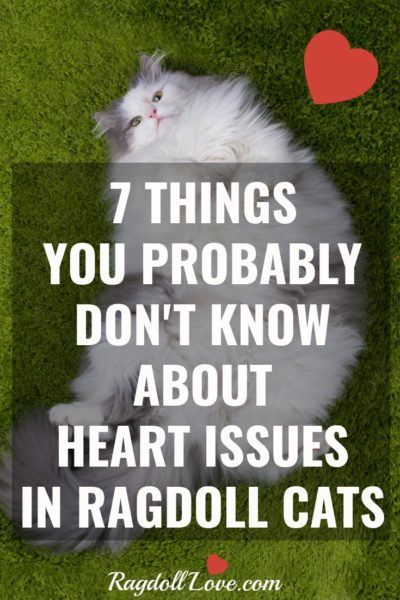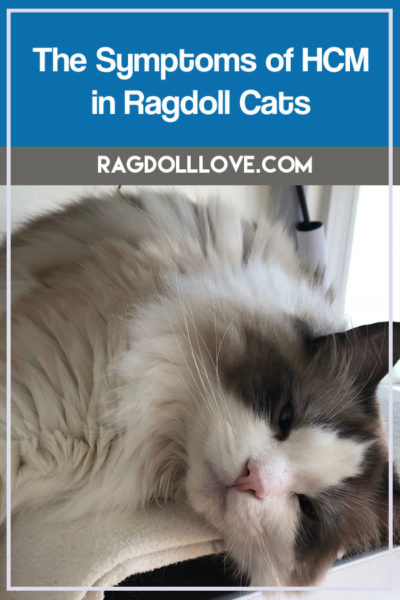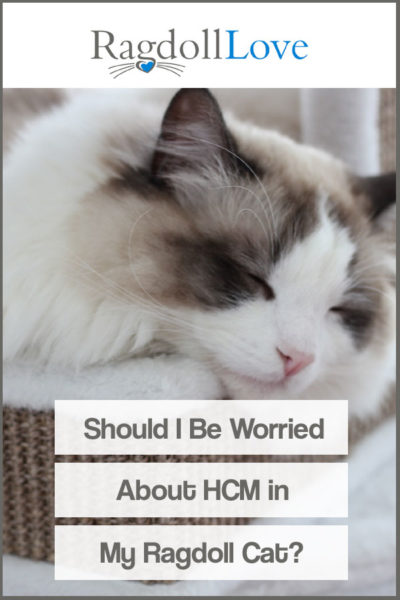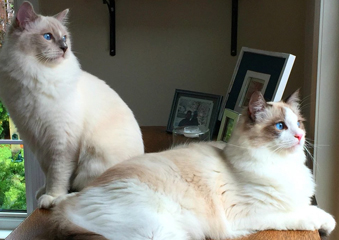Ragdoll owners are lucky in that this breed is relatively healthy. Unfortunately, they aren’t invincible! Ragdolls suffer from an already common heart issue called HCM.
So, what is it, how do you deal with it and should you be worried?
Here’s the rundown of what to expect.
What is HCM?
Hypertrophic Cardiomyopathy sounds daunting but it’s pretty simple. The heart walls thicken making it more difficult for the heart to pump blood.
HCM is a pretty common type of heart failure in larger breeds of cats but any cat is susceptible. HCM is reported as having a high prevalence in Ragdolls although this could be because testing is done more frequently than it would be, for example, in the average domestic breed of house cat.
Any cat can get HCM. In fact, even humans can get HCM.
Related > How Long Do Ragdoll Cats Live?
Heart Issues in Ragdoll Cats – What are the symptoms of HCM?
Unfortunately, most cats do not often show any symptoms in early stages of the disease.
- Know possible symptoms.
According to VetMed.wsu.edu, you may notice the following symptoms in instances where HCM has led to heart failure: “lethargy, decreased activity level, rapid and/or labored breathing and possibly open mouth breathing with excitement or exercise.”
- Regular screening.
Other symptoms for heart issues you can watch for during veterinary visits include a heart murmur, abnormal lung sounds or irregular heartbeat.
Ask your veterinarian to screen for these issues once a year in order to know if your Ragdoll needs further attention.
Just an FYI, my male cat, MacIntosh, had a very faint heart murmur, which never affected him adversely. So, don’t worry too much if your cat starts showing early symptoms. No sense giving yourself a heart attack worrying about your baby!
- Pay attention to signs that something may be wrong.
You know your cat better than anyone else, including your vet. Watch for potential signs of heart disease include lethargy, depression, and decreased appetite.
If you suspect something is wrong then your vet can perform routine tests to check your cat’s heart rate and heart health. More extensive tests can be done such as an EKG or x-ray if HCM is suspected.
- Consult with your vet.
The most important thing you can do is consult with your vet. If you have a vet that you trust and that regularly sees your Ragdoll then together you can keep a close eye on the early symptoms of HCM.
Keep him on a healthy diet and continue to monitor for more serious signs.
Always listen to the advice of your vet.
Related Article > 10 Tips For Adding Years to the Life of Your Cat
What Can I Do?
- Reducing the chances of developing HCM.
Depending on your preferred style of medicine, there are some preventative measures that can be used to reduce your cat’s chances of developing HCM.
- Some veterinarians advocate for food-based and herbal remedies that improve heart health.
- Other holistic remedies might include acupuncture, homeopathy and Chinese herbal medicine.
- Genetic testing. Some veterinary offices offer genetic testing for the mutation that contributes to the development of HCM.
If you’d like to know early on if your cat is high-risk for the disease then you should consider genetic testing. With this information at hand, you and your vet can create a custom health plan to reduce heart disease contributors.
Unfortunately, there is no known treatment for HCM once it has developed. Your vet may prescribe diuretics, ACE inhibitors or other drugs to prevent blood clots; however, these will only treat the symptom but not the underlying issue.
Sometimes HCM can be caused by hyperthyroidism. If you treat the hyperthyroidism first, some pet owners see improved or reduced issues with HCM.
Related Article > 5 Rules For Feeding Your Cat To Keep Him Around For The Long Haul
The Most Important Thing You Can Do If There’s Suspicion of Heart Problems With Your Cat
The most important thing to remember when dealing with a cat with potential heart issues is that awareness is key to prolonging their health.
- Take mental note of how much your cat eats and drinks. Modify their diet if necessary. Do your best to promote healthy habits such as buying a water fountain to encourage them to drink more water. Switch their diet to heart-healthy, no-grain varieties. Most importantly, listen to your veterinarian.
Cats can live long healthy lives even after being diagnosed with HCM.
It can be devastating to learn that your baby may have a potentially fatal illness but don’t let it discourage you. If anything, it helps you to appreciate every moment you have with them even more.
Related Articles
- How to Choose a Vet For Your Ragdoll Cat
- Why You Should Consider Holistic Veterinary Care For Your Ragdoll Cat
- Pet Insurance For My Ragdoll Cat – Is It Worth It?
- 5 Steps to Kitten Proofing Your Home For Your Ragdoll Kitten





